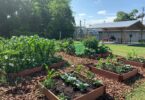Brad Davis describes himself as a “plant person,” a description easy to confirm after seeing the plants he has rooting on the windowsill and watercolor paintings of landscapes that cover the walls of his North Campus office.
“I was the strange kid working in my garden instead of playing kickball down the street,” he said. “I grew up gardening, drawing and painting and figured out I could turn all of that into a career in landscape architecture.”
Now he uses his love of plants and sketching to educate undergraduate and graduate students in a variety of courses as an assistant professor of landscape architecture in the College of Environment and Design. He focuses not only on the food and flowers that grow in the soil, but also on the healing capacity of those gardens.
“There is a special connection we all have to nature, so in addition to the physical benefits of being outdoors, there are many documented psychological benefits, such as a reduction in stress, which leads to overall better health. Stress reduction is a major need in hospitals and other health care settings, and outdoor settings like gardens have been shown to be more effective in reducing stress than indoor environments,” Davis said.
Davis teaches students about the healing aspects of gardens in his course “Health Care and Therapeutic Garden Design.” The course originally was created by professor emerita Marguerite Koepke and now is taught by Davis. Students are tasked with designing healing spaces for a variety of health care settings including those that serve patients battling cancer, suffering from spinal injuries or those with Alzheimer’s disease. Designing effective therapeutic gardens requires taking patient needs into account and changing garden design features based on those needs.
“For example, the types of seating we use in design, particularly for cancer patients, is unique,” Davis said. “Cancer patients report an aversion to metal because chemotherapy often causes a metallic taste in their mouth so they don’t like to sit on metal benches. A seemingly simple thing, but it is a big preferential difference for that population so making sure they have comfortable seating is a major part of a careful and thorough design.”
Fragrant plants are another consideration when planning a healing space. Alzheimer patients benefit from fragrances that trigger memories, but cancer patients might feel ill when sniffing certain smells. Davis said other considerations for gardens include creating a sense of play in children’s gardens or incorporating raised beds and horticultural therapy in gardens for patients with spinal injuries.
Davis’ students worked last fall to create the master plan for a series of therapeutic gardens at the Loran Smith Center for Cancer Support in Athens. The final plan, by former graduate student Katie Pigott, includes seven distinct areas for therapy.
“A lot of patient types benefit from doing regular gardening activities, like digging, watering and planting,” Davis said “These types of activities are parallel to physical therapy.”
Davis’ research examines the role of gardens in providing outdoor places for physical therapy as well as gardening activities. He is looking to expand his research to include tests for stress hormone reduction in patients with access to healing gardens and how the body responds to the treatment.
Most therapeutic gardens combine a mix of passive, or reflective, areas, with areas for engagement. Davis has worked this semester with graduate student Thomas Baker to finalize plans for a labyrinth that will encourage walking and a place for quiet meditation. It is scheduled to be constructed at the Loran Smith Center this summer.
His advice for therapy in a home garden: “You might want to include a couple of herbs that can serve your sense of smell and that you can cook with-rosemary, thyme and mint are beautiful and useful. And, I would incorporate a small place to sit and enjoy your surroundings.
“All of us need beauty in our lives and an opportunity to escape from life’s stressors and enjoy the quiet solitude of a garden,” Davis said. “Take a few minutes each day to turn off the laptop and the smartphone and let nature do its work of restoration.”








